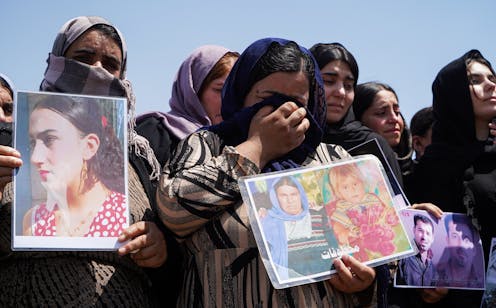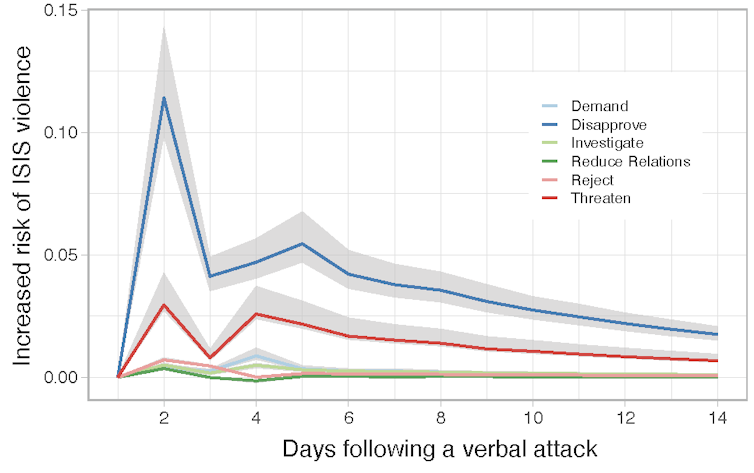
After an Islamic State group-inspired attack in New Orleans killed 14 people on New Year’s Day 2025, President Joe Biden warned that terrorists would find “no safe harbor” in the U.S.
Governments often condemn terrorist groups in this way, as well as making threats and engaging in what we call “verbal attacks.”
But such an approach may be counterproductive; extremist groups tend to respond to such comments by ratcheting up violence against civilians. That’s what we found when we analyzed six years of data on incidents of terrorist violence and their proximity to government denunciations.
Our study focused primarily on the Islamic State group.
The extremist organization came to the world’s attention in early 2014, when it began seizing territory in Iraq and Syria. At the height of its power in 2015, the Islamic State group controlled over 100,000 square kilometers (39,000 square miles).
Although it has declined substantially since then, the group remains the world’s deadliest terror organization – responsible for nearly 2,000 deaths in 2023.
The rapid metastasis of the Islamic State group – it has affiliates across the Middle East, North Africa and South Asia – combined with the extreme brutality of its tactics, triggered waves of condemnations by foreign governments. Former U.S. president Barack Obama initially referred to the Islamic State group as the “JV team” in 2014, implying that the group was not as formidable an opponent as more established groups like al-Qaida. A year later, he vowed to “destroy” the group.
Our motivating research question is whether these and similar statements affect terrorists’ behavior.
Traditionally, researchers have dismissed statements like this as “cheap talk.” And government officials similarly do not take seriously the possibility that such statements might have unintended consequences or inflict actual costs.
But when extremist groups commit terror attacks, they always have an audience in mind. And the Islamic State group closely monitors how governments respond to its actions.
Terrorist groups use attacks on civilians to illustrate the extreme measures they are willing to take to achieve their goals. Our research suggests that when governments denounce terrorists, reject their demands or make retaliatory threats, targeted groups infer that they are not being taken seriously. As a result, they commit further atrocities against civilians, with the intent of signaling their intentions and capabilities even more forcefully.
To confirm this, we used a large-scale machine-coded dataset known as the Integrated Crisis Early Warning System to extract daily data on all events involving the Islamic State group for the period 2014 to 2020. We then employed a coding system known as CAMEO to identify events where governments threatened, denounced or otherwise verbally attacked the group.
We found that when governments initiated any form of verbal attack against the organization, the Islamic State group responded by targeting civilians, typically within two days of a verbal attack.

Our model showed that every three verbal attacks by governments led to an additional, otherwise unexpected attack by the Islamic State group on civilians. These attacks averaged over six deaths per attack, so the humanitarian consequences of this effect are substantial.
Why it matters
Government leaders face enormous pressures to address national security threats, and terrorism is a powerful source of anxiety for citizens.
Yet, counterterrorism is expensive, risky and logistically difficult.
As such, publicly threatening or denouncing an organization offers a tempting alternative strategy. But there has been little research into how government leaders’ words might backfire, encouraging extremists to attack civilians.
At the same time, although the Islamic State group has diminished greatly in capacity, transnational terrorism continues to flourish. And the resurgence of the Islamic State group remains a threat to security in the Middle East and beyond.
What still isn’t known
We extended the analysis to the terrorist groups Boko Haram in Nigeria and Al-Qaida in Iraq, and we found similar results. But further research is needed to determine whether this pattern holds for terrorist groups in general.
Our theory argues that extremists respond so strongly to verbal attacks because they view those remarks as questioning the group’s credibility – a phenomenon we refer to as a “credibility deficit.”
But terrorists have many motivations, including the desire to control territory and repress dissent. We don’t yet know the magnitude of these influences relative to credibility.
The Research Brief is a short take on interesting academic work.
Brandon J. Kinne receives funding from the Minerva Research Initiative of the US Office of Naval Research, grants #FA9550-23-1-0471 and #W911NF-19-1-0332.
Iliyan Iliev gratefully acknowledges support from the Minerva Research Initiative of the US Office of Naval Research, grant #FA9550-23-1-0471.
Nahrain Bet Younadam does not work for, consult, own shares in or receive funding from any company or organization that would benefit from this article, and has disclosed no relevant affiliations beyond their academic appointment.
This article was originally published on The Conversation. Read the original article.







